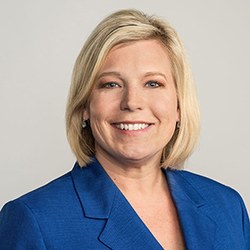Editor’s note: This past January, ASA surveyed its members about what it takes to be a leader in the field of aging, what members would like to learn about how to develop leadership knowledge, skills and abilities, and who best personifies leadership. ASA members identified respected leaders in aging—many of whom are well known to the ASA community and to the field at large. This following Q&A with Ramsey Alwin is one in a series of leadership profiles we are featuring in our Generations Now blog.

Ramsey Alwin is the brand-new CEO of the National Council on Aging, having been named to the position in late August. Prior to the NCOA, Alwin served as director of Thought Leadership-Financial Resilience, within Policy, Research & International Affairs at AARP. For Alwin this marks a return to NCOA, as she served as its vice president, Economic Security, from 2009 to 2015.
She sees herself as a thought leader and policy advocate, having “always looked at ‘aging well for all’ as a social justice issue.” Aging well is a personal and professional passion of Alwin’s.
She worked at NCOA for seven years on economic security programs, but says that, being in the aging sector, she had always thought of AARP as an incredible organization and opportunity that was not to be passed up. While at AARP she helped to chart its course around financial resilience into the future. After five years on their thought leadership team, where she developed AARP’s point of view on the future of work, taking into account how aging and longevity would have as profound an impact on how America works as would automation and globalization. And she worked on how to maximize the multigenerational workforce.
When Jim Firman retired from NCOA and Alwin had a chance to return, she said she was honored for the opportunity as she could focus on creating a just and caring society for older adults and their families, by marshalling all of NCOA’s advocacy efforts, community partnerships and consumer insights to help millions of older adults attain health and economic security.
Generations Now (GN): How might you describe the way leadership in the field of aging differs from leadership in other fields?
Ramsey Alwin (RA): Leadership in the field of aging is a calling for people who want to make the world a better place for older adults, families, friends, the community and the nation. Every leader I know in the field of aging wants to make a difference, and improve systems in order to allow people to age with dignity, purpose and security. There is often a personal experience or passion driving that inspiration. It’s a special field and a special set of leaders. We continue to stand on the shoulders of giants. As I look to the future, and my generation’s contributions, I see an opportunity to step up and make transformative change.
GN: How did you use networking to progress in the field of aging?
RA: Early on I had mentors and coaches and am most grateful for how they shared with me that if you want to be the best you must be in the circle of the best. You must be in the room where it happens, connected to those who are making it happen. I was always interested in opportunities to connect and to learn from those who forged the trail before me. I always listened and learned the mentality of leaders, and tried to absorb the wisdom in the room. I quickly realized that often the most important insight is to accept that you don’t know what you don’t know, but if you ask questions you can further understand the complexities of what’s going on. There is rarely a dumb question and you will always learn. Remain curious. Networking is key.
As I began to advance professionally and became more tenured, I started to look in the other direction, to be intentional about engaging the next generation of leaders. Millennials and Gen Zers are bringing in a new set of expectations to the aging field. This added perspective can help us see paths where we may not have before. Now I’m trying to build out that end of my networking continuum.
GN: What sort of education did you find most helpful?
RA: I found in this field in particular that it’s critical to have empathy and engage with the end user, paying attention to the adage about doing nothing about us without us. As for formal education, I went to an all woman’s college in Boston to pursue a career in teaching, which is where I was shown some of the systemic challenges in play around defacto segregation perpetuating poverty cycles. I built on that understanding of systemic failure with skills-building in public policy and in editorial. I didn’t go back to graduate school until recently. Early on, one mentor suggested I wait to go back to school until I had built up a large network of contacts in the field and had some life experience to contextualize my advanced education. I took her word seriously. I went back to Georgetown’s McDonough School of Business while I was at AARP. I was able to apply the life lessons I had learned, take them with me back into the classroom and then put the classroom theory into practice at AARP and NCOA.
GN: What do you think is the most critical skill to have as a leader?
RA: Impactful leaders set a vision, determine a strategy and remain disciplined and focused on that strategy, supporting and inspiring a team of committed professionals to take action. Truly effective leaders have transformational leadership ability.
GN: Can you speak to one leadership challenge encountered on the job and how you met it?
RA: I have worked at several national organizations and national movements to create paradigm shifts. I have found there is always a tension between national organizations and community partners. You need to be responsive to community-based organizations while listening and learning from what you are seeing on the front lines, and then translating it.
The challenge is how does a national organization create change at the national level while honoring and learning from local community-based organizations and building a peer community? No doubt, local communities are the laboratories of innovation and it is important to support the 1,000 flowers as they bloom. The relevance of the national organization is in facilitating the cross pollination of promising practices and engaging local leaders in elevating practices poised for scale whether it be program or policy.
GN: What might you say to inspire younger potential leaders in the aging sector?
RA: The aging sector is full of opportunity and potential for game changers. There’s the aging of over 71 million baby boomers and 72 million Millennials, and such an opportunity to transform systems, programs and policies to ensure we can all age well. For young leaders there is a lot of runway to make your mark on aging as a social justice issue. We are ripe with challenges when we have 60 percent of older African American and Latina/Hispanic women aging into economic insecurity due to a lifetime of cumulative disadvantage—pay inequity, time out of the workforce due to caregiving, occupational segregation into low-wage work and a safety net that is woefully in need of strengthening. We need more curious minds and passionate advocates to join the movement to ensure equitable aging for all regardless of race or ethnicity, gender, education, income or ZIP Code.













